LAW 6218 - Professional Responsibility: Case Studies and Ethics
VerifiedAdded on 2022/09/11
|8
|2056
|16
Homework Assignment
AI Summary
This document presents solutions to a legal ethics and professional responsibility assignment, addressing five distinct questions. The first question examines attorney-client privilege and the ethical obligations of legal professionals. The second delves into fee arrangements and client protection laws within the American Bar Association guidelines. The third explores conflicts of interest, particularly in the context of representing multiple parties. The fourth addresses potential personal liability for lawyers in cases of misrepresentation or fraud. Finally, the fifth question discusses antitrust issues that may arise during company mergers and the role of antitrust attorneys. The document references relevant legal rules, ethical standards, and case law to support its analysis. Desklib offers a wealth of resources for students, including past papers and solved assignments.
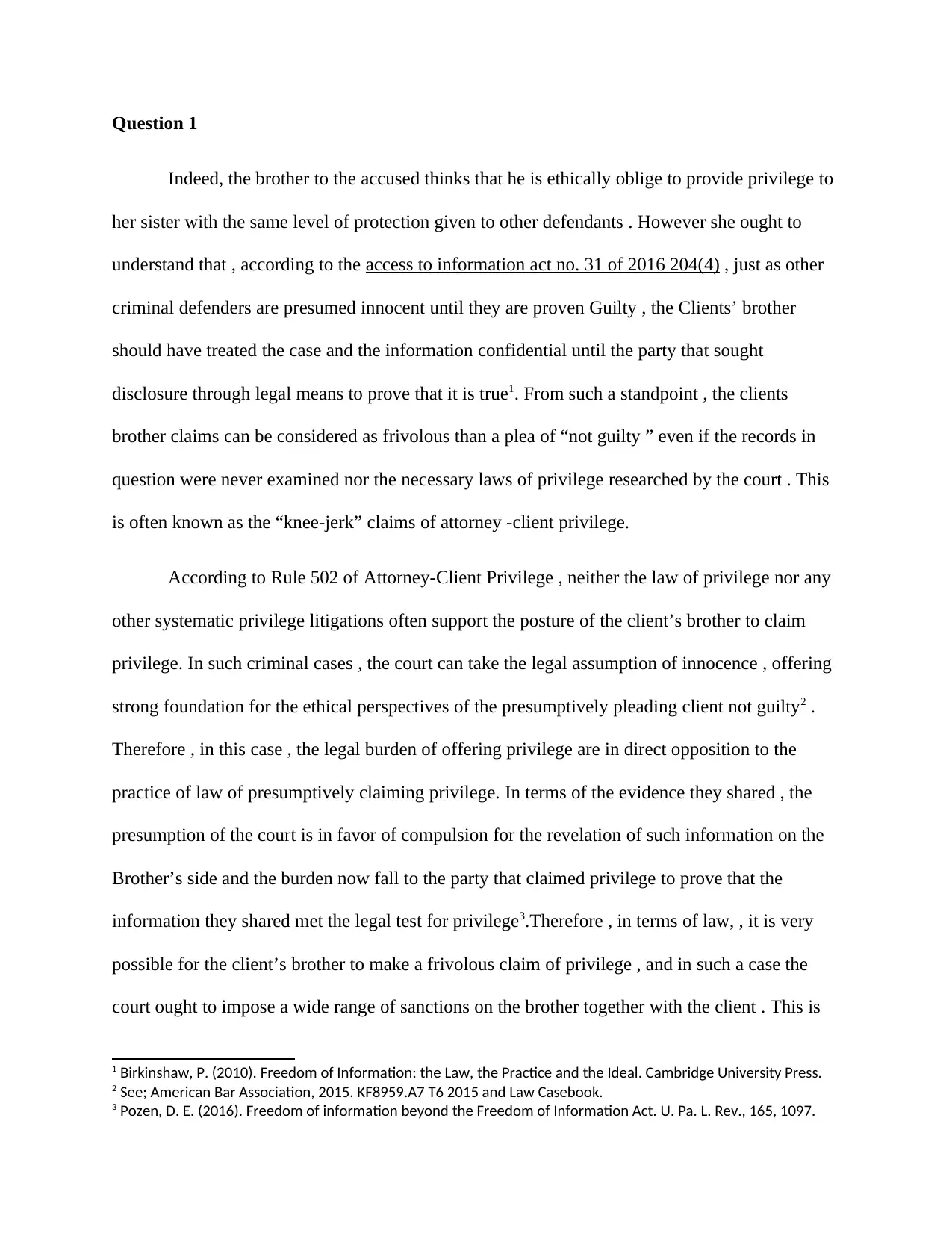
Question 1
Indeed, the brother to the accused thinks that he is ethically oblige to provide privilege to
her sister with the same level of protection given to other defendants . However she ought to
understand that , according to the access to information act no. 31 of 2016 204(4) , just as other
criminal defenders are presumed innocent until they are proven Guilty , the Clients’ brother
should have treated the case and the information confidential until the party that sought
disclosure through legal means to prove that it is true1. From such a standpoint , the clients
brother claims can be considered as frivolous than a plea of “not guilty ” even if the records in
question were never examined nor the necessary laws of privilege researched by the court . This
is often known as the “knee-jerk” claims of attorney -client privilege.
According to Rule 502 of Attorney-Client Privilege , neither the law of privilege nor any
other systematic privilege litigations often support the posture of the client’s brother to claim
privilege. In such criminal cases , the court can take the legal assumption of innocence , offering
strong foundation for the ethical perspectives of the presumptively pleading client not guilty2 .
Therefore , in this case , the legal burden of offering privilege are in direct opposition to the
practice of law of presumptively claiming privilege. In terms of the evidence they shared , the
presumption of the court is in favor of compulsion for the revelation of such information on the
Brother’s side and the burden now fall to the party that claimed privilege to prove that the
information they shared met the legal test for privilege3.Therefore , in terms of law, , it is very
possible for the client’s brother to make a frivolous claim of privilege , and in such a case the
court ought to impose a wide range of sanctions on the brother together with the client . This is
1 Birkinshaw, P. (2010). Freedom of Information: the Law, the Practice and the Ideal. Cambridge University Press.
2 See; American Bar Association, 2015. KF8959.A7 T6 2015 and Law Casebook.
3 Pozen, D. E. (2016). Freedom of information beyond the Freedom of Information Act. U. Pa. L. Rev., 165, 1097.
Indeed, the brother to the accused thinks that he is ethically oblige to provide privilege to
her sister with the same level of protection given to other defendants . However she ought to
understand that , according to the access to information act no. 31 of 2016 204(4) , just as other
criminal defenders are presumed innocent until they are proven Guilty , the Clients’ brother
should have treated the case and the information confidential until the party that sought
disclosure through legal means to prove that it is true1. From such a standpoint , the clients
brother claims can be considered as frivolous than a plea of “not guilty ” even if the records in
question were never examined nor the necessary laws of privilege researched by the court . This
is often known as the “knee-jerk” claims of attorney -client privilege.
According to Rule 502 of Attorney-Client Privilege , neither the law of privilege nor any
other systematic privilege litigations often support the posture of the client’s brother to claim
privilege. In such criminal cases , the court can take the legal assumption of innocence , offering
strong foundation for the ethical perspectives of the presumptively pleading client not guilty2 .
Therefore , in this case , the legal burden of offering privilege are in direct opposition to the
practice of law of presumptively claiming privilege. In terms of the evidence they shared , the
presumption of the court is in favor of compulsion for the revelation of such information on the
Brother’s side and the burden now fall to the party that claimed privilege to prove that the
information they shared met the legal test for privilege3.Therefore , in terms of law, , it is very
possible for the client’s brother to make a frivolous claim of privilege , and in such a case the
court ought to impose a wide range of sanctions on the brother together with the client . This is
1 Birkinshaw, P. (2010). Freedom of Information: the Law, the Practice and the Ideal. Cambridge University Press.
2 See; American Bar Association, 2015. KF8959.A7 T6 2015 and Law Casebook.
3 Pozen, D. E. (2016). Freedom of information beyond the Freedom of Information Act. U. Pa. L. Rev., 165, 1097.
Paraphrase This Document
Need a fresh take? Get an instant paraphrase of this document with our AI Paraphraser
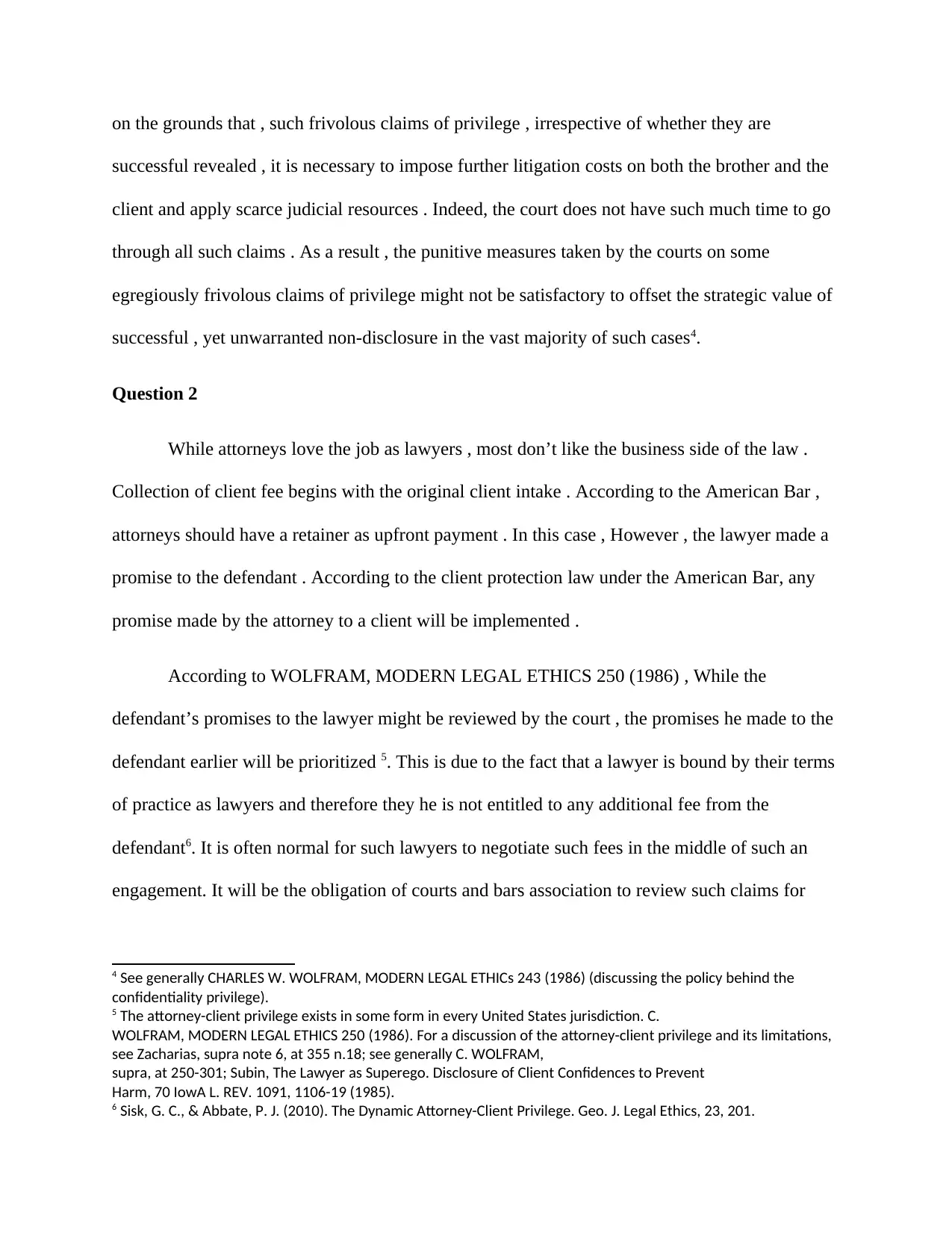
on the grounds that , such frivolous claims of privilege , irrespective of whether they are
successful revealed , it is necessary to impose further litigation costs on both the brother and the
client and apply scarce judicial resources . Indeed, the court does not have such much time to go
through all such claims . As a result , the punitive measures taken by the courts on some
egregiously frivolous claims of privilege might not be satisfactory to offset the strategic value of
successful , yet unwarranted non-disclosure in the vast majority of such cases4.
Question 2
While attorneys love the job as lawyers , most don’t like the business side of the law .
Collection of client fee begins with the original client intake . According to the American Bar ,
attorneys should have a retainer as upfront payment . In this case , However , the lawyer made a
promise to the defendant . According to the client protection law under the American Bar, any
promise made by the attorney to a client will be implemented .
According to WOLFRAM, MODERN LEGAL ETHICS 250 (1986) , While the
defendant’s promises to the lawyer might be reviewed by the court , the promises he made to the
defendant earlier will be prioritized 5. This is due to the fact that a lawyer is bound by their terms
of practice as lawyers and therefore they he is not entitled to any additional fee from the
defendant6. It is often normal for such lawyers to negotiate such fees in the middle of such an
engagement. It will be the obligation of courts and bars association to review such claims for
4 See generally CHARLES W. WOLFRAM, MODERN LEGAL ETHICs 243 (1986) (discussing the policy behind the
confidentiality privilege).
5 The attorney-client privilege exists in some form in every United States jurisdiction. C.
WOLFRAM, MODERN LEGAL ETHICS 250 (1986). For a discussion of the attorney-client privilege and its limitations,
see Zacharias, supra note 6, at 355 n.18; see generally C. WOLFRAM,
supra, at 250-301; Subin, The Lawyer as Superego. Disclosure of Client Confidences to Prevent
Harm, 70 IowA L. REV. 1091, 1106-19 (1985).
6 Sisk, G. C., & Abbate, P. J. (2010). The Dynamic Attorney-Client Privilege. Geo. J. Legal Ethics, 23, 201.
successful revealed , it is necessary to impose further litigation costs on both the brother and the
client and apply scarce judicial resources . Indeed, the court does not have such much time to go
through all such claims . As a result , the punitive measures taken by the courts on some
egregiously frivolous claims of privilege might not be satisfactory to offset the strategic value of
successful , yet unwarranted non-disclosure in the vast majority of such cases4.
Question 2
While attorneys love the job as lawyers , most don’t like the business side of the law .
Collection of client fee begins with the original client intake . According to the American Bar ,
attorneys should have a retainer as upfront payment . In this case , However , the lawyer made a
promise to the defendant . According to the client protection law under the American Bar, any
promise made by the attorney to a client will be implemented .
According to WOLFRAM, MODERN LEGAL ETHICS 250 (1986) , While the
defendant’s promises to the lawyer might be reviewed by the court , the promises he made to the
defendant earlier will be prioritized 5. This is due to the fact that a lawyer is bound by their terms
of practice as lawyers and therefore they he is not entitled to any additional fee from the
defendant6. It is often normal for such lawyers to negotiate such fees in the middle of such an
engagement. It will be the obligation of courts and bars association to review such claims for
4 See generally CHARLES W. WOLFRAM, MODERN LEGAL ETHICs 243 (1986) (discussing the policy behind the
confidentiality privilege).
5 The attorney-client privilege exists in some form in every United States jurisdiction. C.
WOLFRAM, MODERN LEGAL ETHICS 250 (1986). For a discussion of the attorney-client privilege and its limitations,
see Zacharias, supra note 6, at 355 n.18; see generally C. WOLFRAM,
supra, at 250-301; Subin, The Lawyer as Superego. Disclosure of Client Confidences to Prevent
Harm, 70 IowA L. REV. 1091, 1106-19 (1985).
6 Sisk, G. C., & Abbate, P. J. (2010). The Dynamic Attorney-Client Privilege. Geo. J. Legal Ethics, 23, 201.
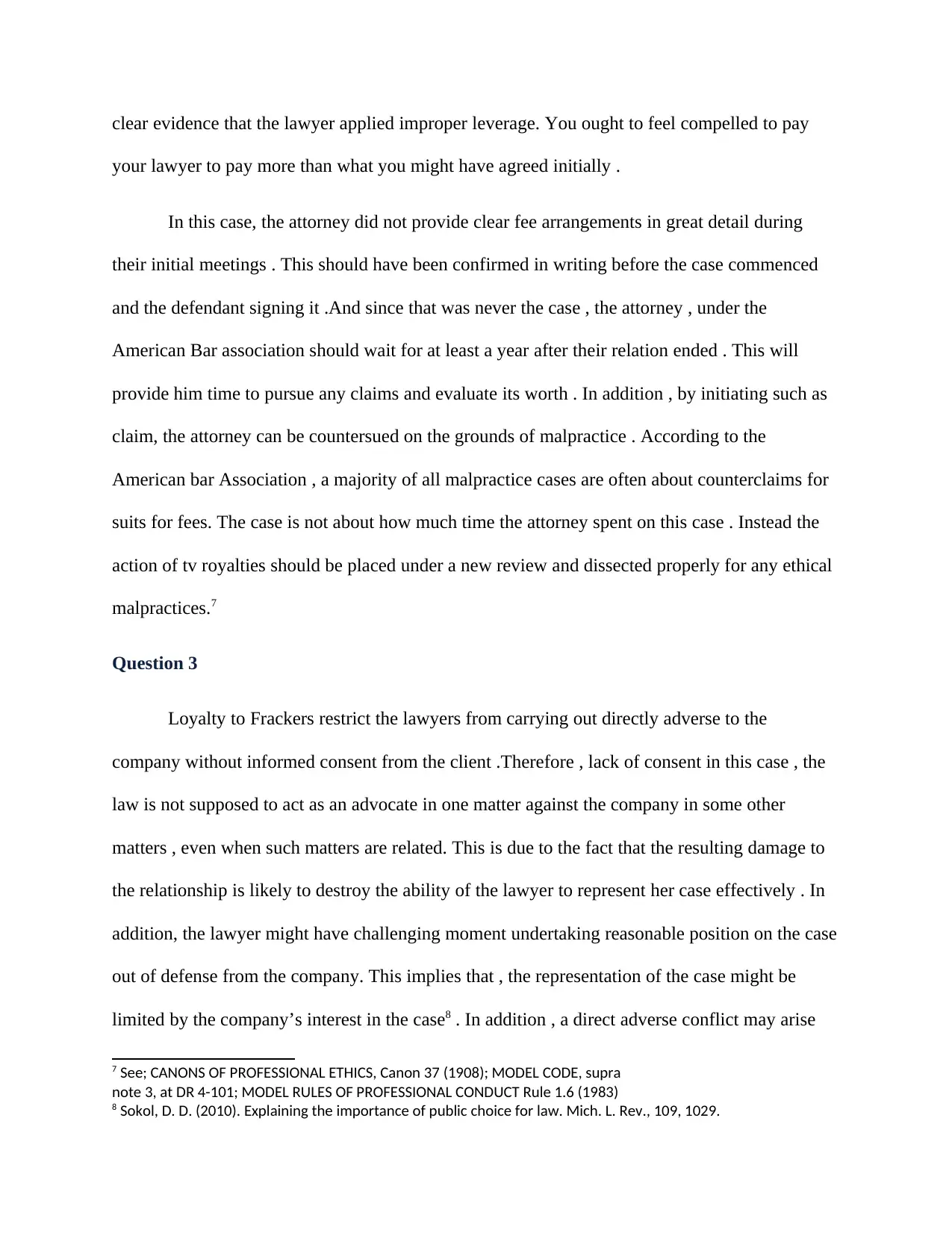
clear evidence that the lawyer applied improper leverage. You ought to feel compelled to pay
your lawyer to pay more than what you might have agreed initially .
In this case, the attorney did not provide clear fee arrangements in great detail during
their initial meetings . This should have been confirmed in writing before the case commenced
and the defendant signing it .And since that was never the case , the attorney , under the
American Bar association should wait for at least a year after their relation ended . This will
provide him time to pursue any claims and evaluate its worth . In addition , by initiating such as
claim, the attorney can be countersued on the grounds of malpractice . According to the
American bar Association , a majority of all malpractice cases are often about counterclaims for
suits for fees. The case is not about how much time the attorney spent on this case . Instead the
action of tv royalties should be placed under a new review and dissected properly for any ethical
malpractices.7
Question 3
Loyalty to Frackers restrict the lawyers from carrying out directly adverse to the
company without informed consent from the client .Therefore , lack of consent in this case , the
law is not supposed to act as an advocate in one matter against the company in some other
matters , even when such matters are related. This is due to the fact that the resulting damage to
the relationship is likely to destroy the ability of the lawyer to represent her case effectively . In
addition, the lawyer might have challenging moment undertaking reasonable position on the case
out of defense from the company. This implies that , the representation of the case might be
limited by the company’s interest in the case8 . In addition , a direct adverse conflict may arise
7 See; CANONS OF PROFESSIONAL ETHICS, Canon 37 (1908); MODEL CODE, supra
note 3, at DR 4-101; MODEL RULES OF PROFESSIONAL CONDUCT Rule 1.6 (1983)
8 Sokol, D. D. (2010). Explaining the importance of public choice for law. Mich. L. Rev., 109, 1029.
your lawyer to pay more than what you might have agreed initially .
In this case, the attorney did not provide clear fee arrangements in great detail during
their initial meetings . This should have been confirmed in writing before the case commenced
and the defendant signing it .And since that was never the case , the attorney , under the
American Bar association should wait for at least a year after their relation ended . This will
provide him time to pursue any claims and evaluate its worth . In addition , by initiating such as
claim, the attorney can be countersued on the grounds of malpractice . According to the
American bar Association , a majority of all malpractice cases are often about counterclaims for
suits for fees. The case is not about how much time the attorney spent on this case . Instead the
action of tv royalties should be placed under a new review and dissected properly for any ethical
malpractices.7
Question 3
Loyalty to Frackers restrict the lawyers from carrying out directly adverse to the
company without informed consent from the client .Therefore , lack of consent in this case , the
law is not supposed to act as an advocate in one matter against the company in some other
matters , even when such matters are related. This is due to the fact that the resulting damage to
the relationship is likely to destroy the ability of the lawyer to represent her case effectively . In
addition, the lawyer might have challenging moment undertaking reasonable position on the case
out of defense from the company. This implies that , the representation of the case might be
limited by the company’s interest in the case8 . In addition , a direct adverse conflict may arise
7 See; CANONS OF PROFESSIONAL ETHICS, Canon 37 (1908); MODEL CODE, supra
note 3, at DR 4-101; MODEL RULES OF PROFESSIONAL CONDUCT Rule 1.6 (1983)
8 Sokol, D. D. (2010). Explaining the importance of public choice for law. Mich. L. Rev., 109, 1029.
⊘ This is a preview!⊘
Do you want full access?
Subscribe today to unlock all pages.

Trusted by 1+ million students worldwide
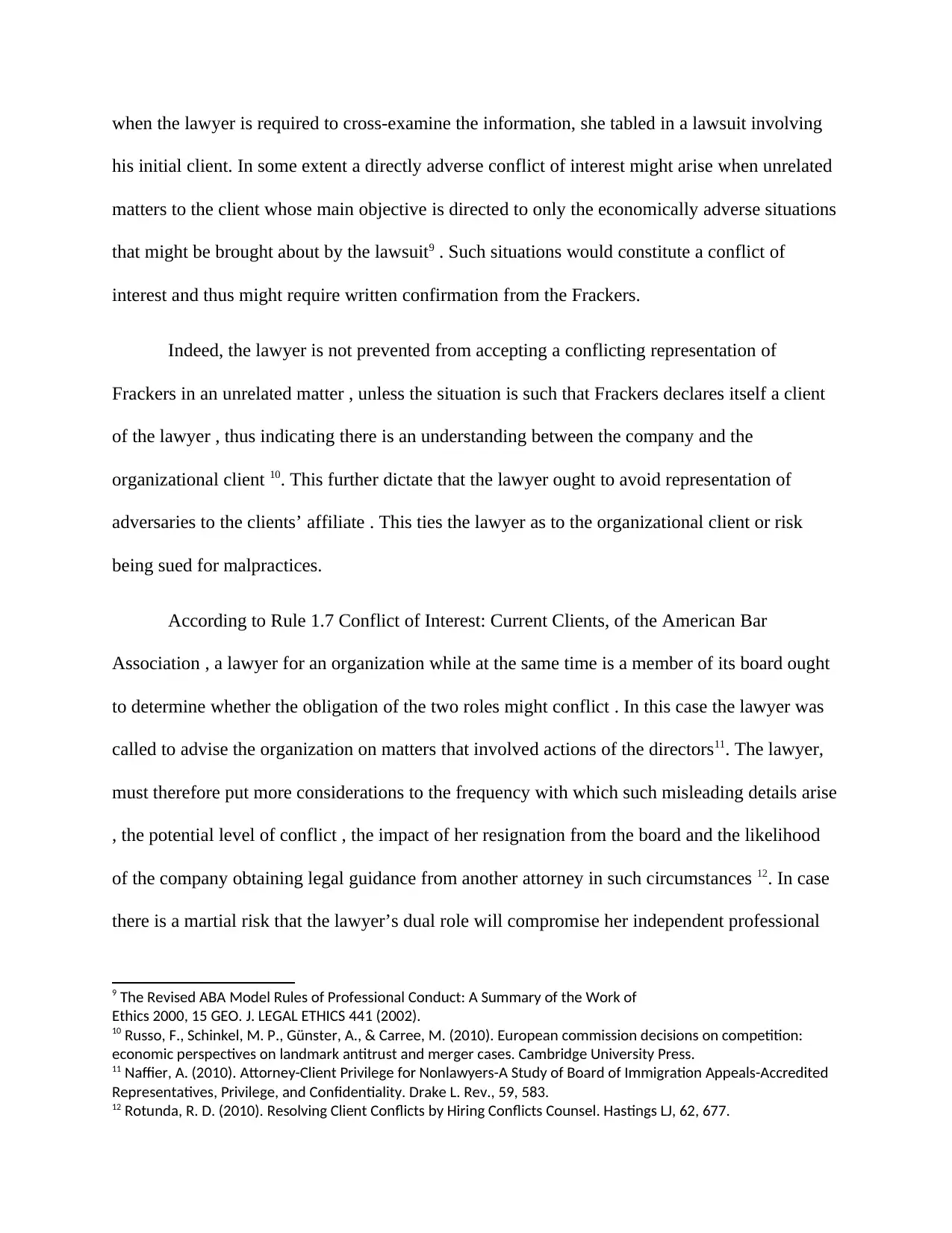
when the lawyer is required to cross-examine the information, she tabled in a lawsuit involving
his initial client. In some extent a directly adverse conflict of interest might arise when unrelated
matters to the client whose main objective is directed to only the economically adverse situations
that might be brought about by the lawsuit9 . Such situations would constitute a conflict of
interest and thus might require written confirmation from the Frackers.
Indeed, the lawyer is not prevented from accepting a conflicting representation of
Frackers in an unrelated matter , unless the situation is such that Frackers declares itself a client
of the lawyer , thus indicating there is an understanding between the company and the
organizational client 10. This further dictate that the lawyer ought to avoid representation of
adversaries to the clients’ affiliate . This ties the lawyer as to the organizational client or risk
being sued for malpractices.
According to Rule 1.7 Conflict of Interest: Current Clients, of the American Bar
Association , a lawyer for an organization while at the same time is a member of its board ought
to determine whether the obligation of the two roles might conflict . In this case the lawyer was
called to advise the organization on matters that involved actions of the directors11. The lawyer,
must therefore put more considerations to the frequency with which such misleading details arise
, the potential level of conflict , the impact of her resignation from the board and the likelihood
of the company obtaining legal guidance from another attorney in such circumstances 12. In case
there is a martial risk that the lawyer’s dual role will compromise her independent professional
9 The Revised ABA Model Rules of Professional Conduct: A Summary of the Work of
Ethics 2000, 15 GEO. J. LEGAL ETHICS 441 (2002).
10 Russo, F., Schinkel, M. P., Günster, A., & Carree, M. (2010). European commission decisions on competition:
economic perspectives on landmark antitrust and merger cases. Cambridge University Press.
11 Naffier, A. (2010). Attorney-Client Privilege for Nonlawyers-A Study of Board of Immigration Appeals-Accredited
Representatives, Privilege, and Confidentiality. Drake L. Rev., 59, 583.
12 Rotunda, R. D. (2010). Resolving Client Conflicts by Hiring Conflicts Counsel. Hastings LJ, 62, 677.
his initial client. In some extent a directly adverse conflict of interest might arise when unrelated
matters to the client whose main objective is directed to only the economically adverse situations
that might be brought about by the lawsuit9 . Such situations would constitute a conflict of
interest and thus might require written confirmation from the Frackers.
Indeed, the lawyer is not prevented from accepting a conflicting representation of
Frackers in an unrelated matter , unless the situation is such that Frackers declares itself a client
of the lawyer , thus indicating there is an understanding between the company and the
organizational client 10. This further dictate that the lawyer ought to avoid representation of
adversaries to the clients’ affiliate . This ties the lawyer as to the organizational client or risk
being sued for malpractices.
According to Rule 1.7 Conflict of Interest: Current Clients, of the American Bar
Association , a lawyer for an organization while at the same time is a member of its board ought
to determine whether the obligation of the two roles might conflict . In this case the lawyer was
called to advise the organization on matters that involved actions of the directors11. The lawyer,
must therefore put more considerations to the frequency with which such misleading details arise
, the potential level of conflict , the impact of her resignation from the board and the likelihood
of the company obtaining legal guidance from another attorney in such circumstances 12. In case
there is a martial risk that the lawyer’s dual role will compromise her independent professional
9 The Revised ABA Model Rules of Professional Conduct: A Summary of the Work of
Ethics 2000, 15 GEO. J. LEGAL ETHICS 441 (2002).
10 Russo, F., Schinkel, M. P., Günster, A., & Carree, M. (2010). European commission decisions on competition:
economic perspectives on landmark antitrust and merger cases. Cambridge University Press.
11 Naffier, A. (2010). Attorney-Client Privilege for Nonlawyers-A Study of Board of Immigration Appeals-Accredited
Representatives, Privilege, and Confidentiality. Drake L. Rev., 59, 583.
12 Rotunda, R. D. (2010). Resolving Client Conflicts by Hiring Conflicts Counsel. Hastings LJ, 62, 677.
Paraphrase This Document
Need a fresh take? Get an instant paraphrase of this document with our AI Paraphraser
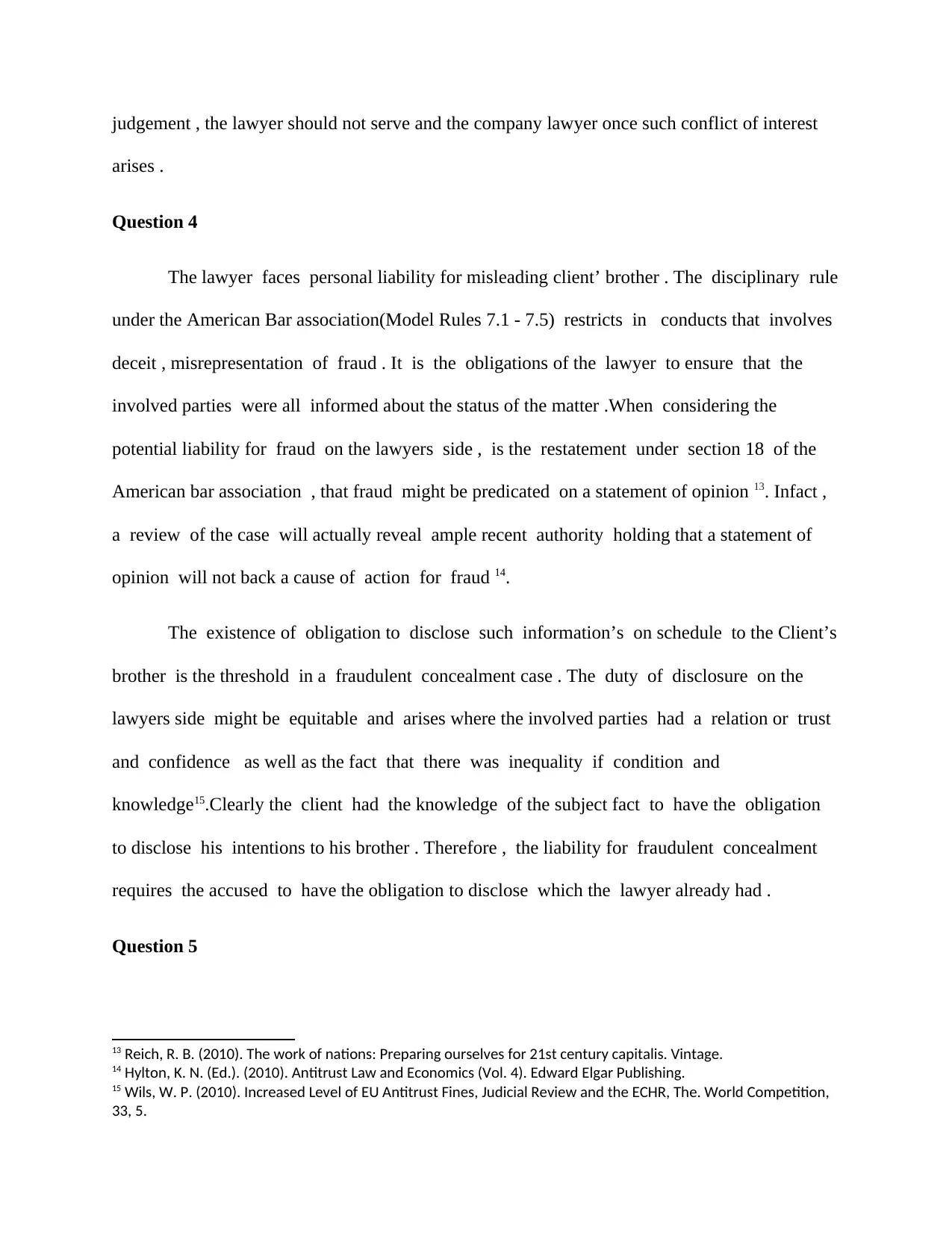
judgement , the lawyer should not serve and the company lawyer once such conflict of interest
arises .
Question 4
The lawyer faces personal liability for misleading client’ brother . The disciplinary rule
under the American Bar association(Model Rules 7.1 - 7.5) restricts in conducts that involves
deceit , misrepresentation of fraud . It is the obligations of the lawyer to ensure that the
involved parties were all informed about the status of the matter .When considering the
potential liability for fraud on the lawyers side , is the restatement under section 18 of the
American bar association , that fraud might be predicated on a statement of opinion 13. Infact ,
a review of the case will actually reveal ample recent authority holding that a statement of
opinion will not back a cause of action for fraud 14.
The existence of obligation to disclose such information’s on schedule to the Client’s
brother is the threshold in a fraudulent concealment case . The duty of disclosure on the
lawyers side might be equitable and arises where the involved parties had a relation or trust
and confidence as well as the fact that there was inequality if condition and
knowledge15.Clearly the client had the knowledge of the subject fact to have the obligation
to disclose his intentions to his brother . Therefore , the liability for fraudulent concealment
requires the accused to have the obligation to disclose which the lawyer already had .
Question 5
13 Reich, R. B. (2010). The work of nations: Preparing ourselves for 21st century capitalis. Vintage.
14 Hylton, K. N. (Ed.). (2010). Antitrust Law and Economics (Vol. 4). Edward Elgar Publishing.
15 Wils, W. P. (2010). Increased Level of EU Antitrust Fines, Judicial Review and the ECHR, The. World Competition,
33, 5.
arises .
Question 4
The lawyer faces personal liability for misleading client’ brother . The disciplinary rule
under the American Bar association(Model Rules 7.1 - 7.5) restricts in conducts that involves
deceit , misrepresentation of fraud . It is the obligations of the lawyer to ensure that the
involved parties were all informed about the status of the matter .When considering the
potential liability for fraud on the lawyers side , is the restatement under section 18 of the
American bar association , that fraud might be predicated on a statement of opinion 13. Infact ,
a review of the case will actually reveal ample recent authority holding that a statement of
opinion will not back a cause of action for fraud 14.
The existence of obligation to disclose such information’s on schedule to the Client’s
brother is the threshold in a fraudulent concealment case . The duty of disclosure on the
lawyers side might be equitable and arises where the involved parties had a relation or trust
and confidence as well as the fact that there was inequality if condition and
knowledge15.Clearly the client had the knowledge of the subject fact to have the obligation
to disclose his intentions to his brother . Therefore , the liability for fraudulent concealment
requires the accused to have the obligation to disclose which the lawyer already had .
Question 5
13 Reich, R. B. (2010). The work of nations: Preparing ourselves for 21st century capitalis. Vintage.
14 Hylton, K. N. (Ed.). (2010). Antitrust Law and Economics (Vol. 4). Edward Elgar Publishing.
15 Wils, W. P. (2010). Increased Level of EU Antitrust Fines, Judicial Review and the ECHR, The. World Competition,
33, 5.
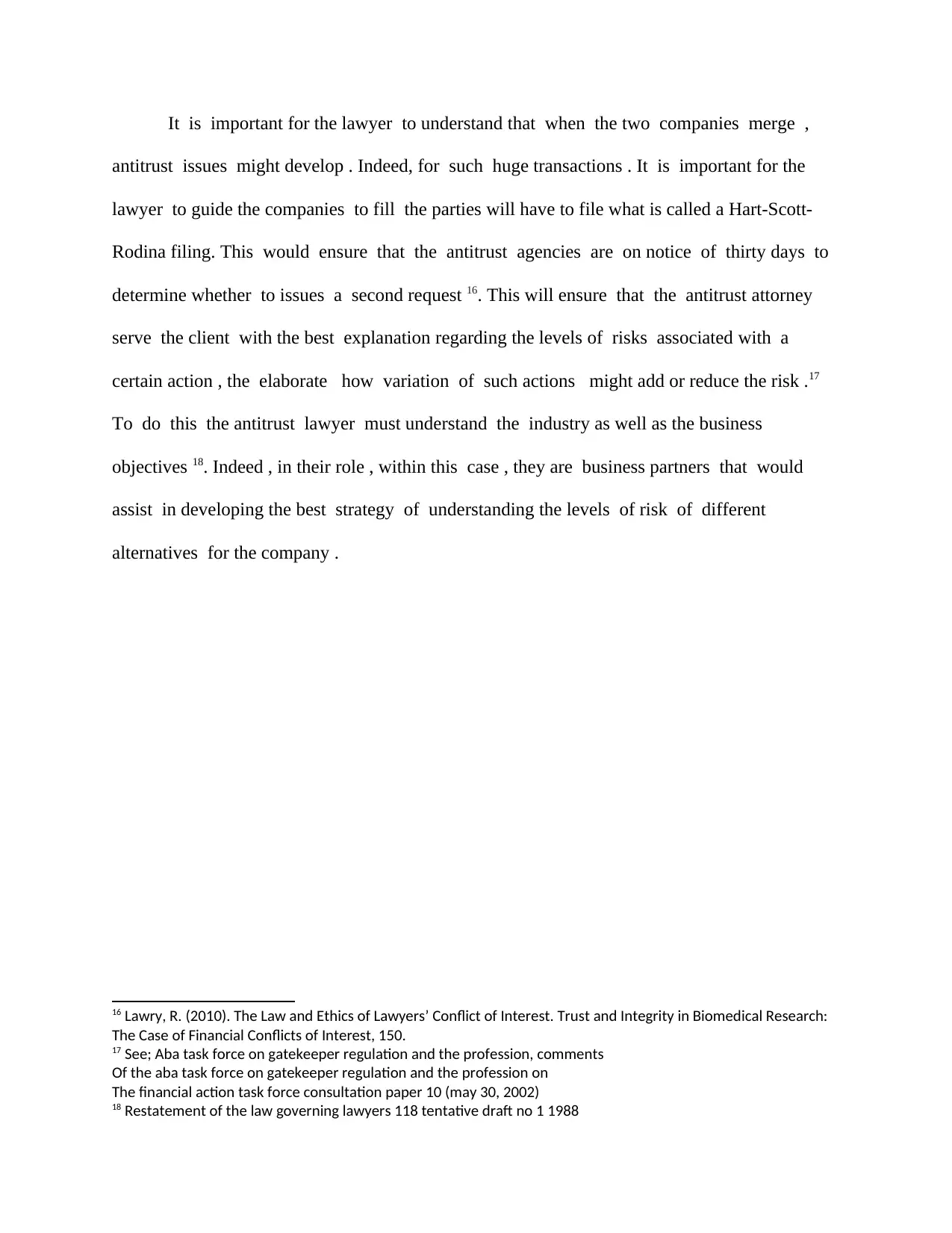
It is important for the lawyer to understand that when the two companies merge ,
antitrust issues might develop . Indeed, for such huge transactions . It is important for the
lawyer to guide the companies to fill the parties will have to file what is called a Hart-Scott-
Rodina filing. This would ensure that the antitrust agencies are on notice of thirty days to
determine whether to issues a second request 16. This will ensure that the antitrust attorney
serve the client with the best explanation regarding the levels of risks associated with a
certain action , the elaborate how variation of such actions might add or reduce the risk .17
To do this the antitrust lawyer must understand the industry as well as the business
objectives 18. Indeed , in their role , within this case , they are business partners that would
assist in developing the best strategy of understanding the levels of risk of different
alternatives for the company .
16 Lawry, R. (2010). The Law and Ethics of Lawyers’ Conflict of Interest. Trust and Integrity in Biomedical Research:
The Case of Financial Conflicts of Interest, 150.
17 See; Aba task force on gatekeeper regulation and the profession, comments
Of the aba task force on gatekeeper regulation and the profession on
The financial action task force consultation paper 10 (may 30, 2002)
18 Restatement of the law governing lawyers 118 tentative draft no 1 1988
antitrust issues might develop . Indeed, for such huge transactions . It is important for the
lawyer to guide the companies to fill the parties will have to file what is called a Hart-Scott-
Rodina filing. This would ensure that the antitrust agencies are on notice of thirty days to
determine whether to issues a second request 16. This will ensure that the antitrust attorney
serve the client with the best explanation regarding the levels of risks associated with a
certain action , the elaborate how variation of such actions might add or reduce the risk .17
To do this the antitrust lawyer must understand the industry as well as the business
objectives 18. Indeed , in their role , within this case , they are business partners that would
assist in developing the best strategy of understanding the levels of risk of different
alternatives for the company .
16 Lawry, R. (2010). The Law and Ethics of Lawyers’ Conflict of Interest. Trust and Integrity in Biomedical Research:
The Case of Financial Conflicts of Interest, 150.
17 See; Aba task force on gatekeeper regulation and the profession, comments
Of the aba task force on gatekeeper regulation and the profession on
The financial action task force consultation paper 10 (may 30, 2002)
18 Restatement of the law governing lawyers 118 tentative draft no 1 1988
⊘ This is a preview!⊘
Do you want full access?
Subscribe today to unlock all pages.

Trusted by 1+ million students worldwide
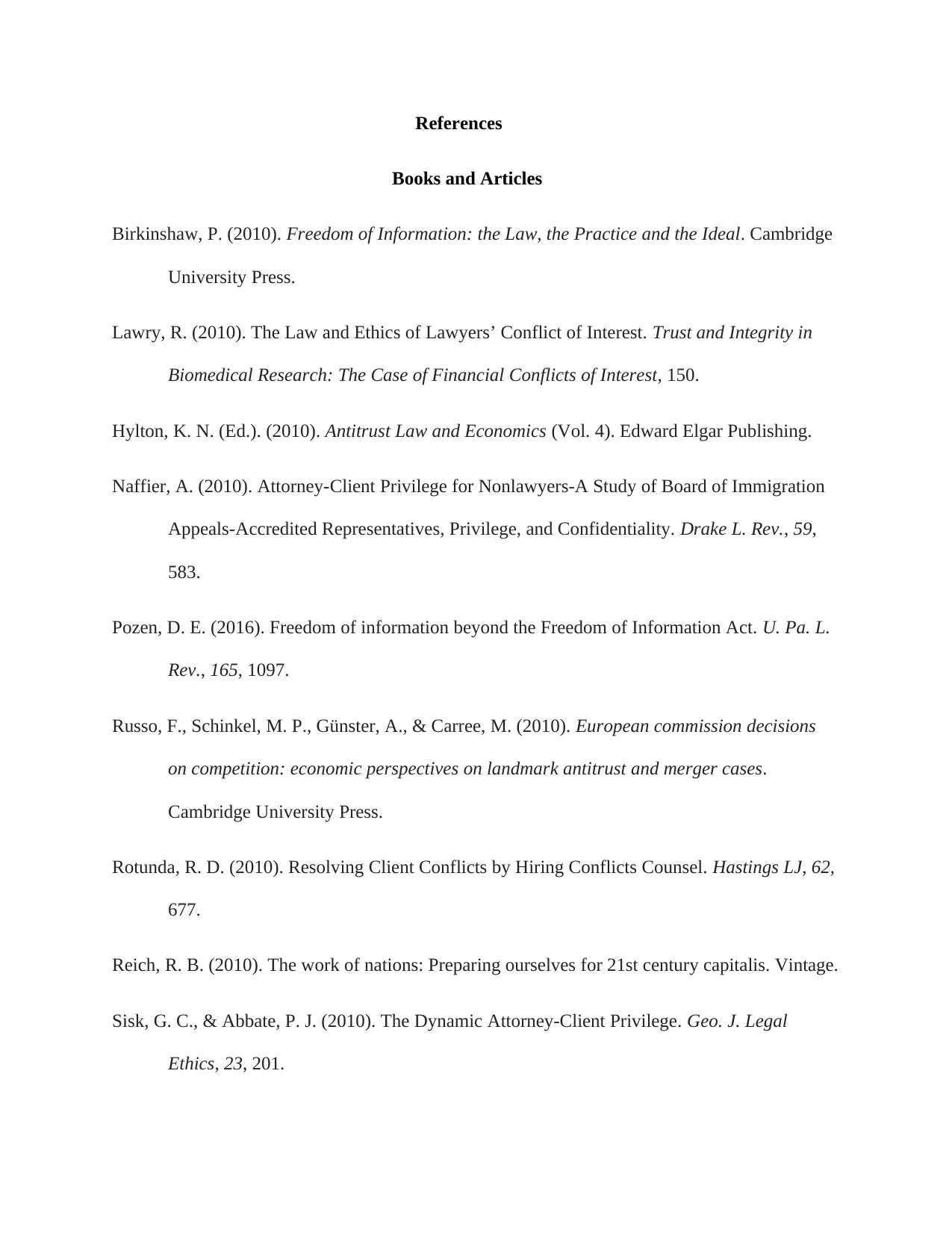
References
Books and Articles
Birkinshaw, P. (2010). Freedom of Information: the Law, the Practice and the Ideal. Cambridge
University Press.
Lawry, R. (2010). The Law and Ethics of Lawyers’ Conflict of Interest. Trust and Integrity in
Biomedical Research: The Case of Financial Conflicts of Interest, 150.
Hylton, K. N. (Ed.). (2010). Antitrust Law and Economics (Vol. 4). Edward Elgar Publishing.
Naffier, A. (2010). Attorney-Client Privilege for Nonlawyers-A Study of Board of Immigration
Appeals-Accredited Representatives, Privilege, and Confidentiality. Drake L. Rev., 59,
583.
Pozen, D. E. (2016). Freedom of information beyond the Freedom of Information Act. U. Pa. L.
Rev., 165, 1097.
Russo, F., Schinkel, M. P., Günster, A., & Carree, M. (2010). European commission decisions
on competition: economic perspectives on landmark antitrust and merger cases.
Cambridge University Press.
Rotunda, R. D. (2010). Resolving Client Conflicts by Hiring Conflicts Counsel. Hastings LJ, 62,
677.
Reich, R. B. (2010). The work of nations: Preparing ourselves for 21st century capitalis. Vintage.
Sisk, G. C., & Abbate, P. J. (2010). The Dynamic Attorney-Client Privilege. Geo. J. Legal
Ethics, 23, 201.
Books and Articles
Birkinshaw, P. (2010). Freedom of Information: the Law, the Practice and the Ideal. Cambridge
University Press.
Lawry, R. (2010). The Law and Ethics of Lawyers’ Conflict of Interest. Trust and Integrity in
Biomedical Research: The Case of Financial Conflicts of Interest, 150.
Hylton, K. N. (Ed.). (2010). Antitrust Law and Economics (Vol. 4). Edward Elgar Publishing.
Naffier, A. (2010). Attorney-Client Privilege for Nonlawyers-A Study of Board of Immigration
Appeals-Accredited Representatives, Privilege, and Confidentiality. Drake L. Rev., 59,
583.
Pozen, D. E. (2016). Freedom of information beyond the Freedom of Information Act. U. Pa. L.
Rev., 165, 1097.
Russo, F., Schinkel, M. P., Günster, A., & Carree, M. (2010). European commission decisions
on competition: economic perspectives on landmark antitrust and merger cases.
Cambridge University Press.
Rotunda, R. D. (2010). Resolving Client Conflicts by Hiring Conflicts Counsel. Hastings LJ, 62,
677.
Reich, R. B. (2010). The work of nations: Preparing ourselves for 21st century capitalis. Vintage.
Sisk, G. C., & Abbate, P. J. (2010). The Dynamic Attorney-Client Privilege. Geo. J. Legal
Ethics, 23, 201.
Paraphrase This Document
Need a fresh take? Get an instant paraphrase of this document with our AI Paraphraser
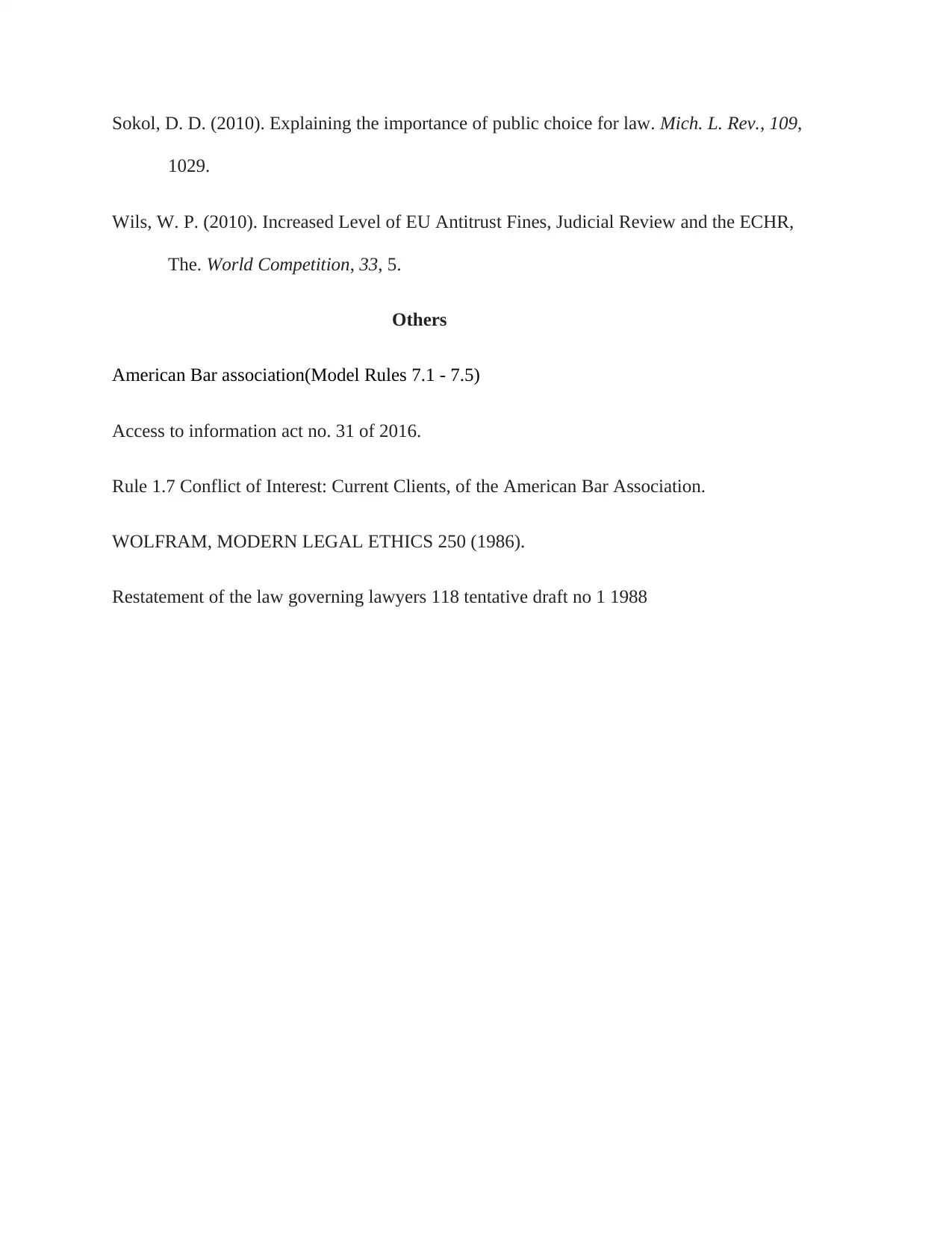
Sokol, D. D. (2010). Explaining the importance of public choice for law. Mich. L. Rev., 109,
1029.
Wils, W. P. (2010). Increased Level of EU Antitrust Fines, Judicial Review and the ECHR,
The. World Competition, 33, 5.
Others
American Bar association(Model Rules 7.1 - 7.5)
Access to information act no. 31 of 2016.
Rule 1.7 Conflict of Interest: Current Clients, of the American Bar Association.
WOLFRAM, MODERN LEGAL ETHICS 250 (1986).
Restatement of the law governing lawyers 118 tentative draft no 1 1988
1029.
Wils, W. P. (2010). Increased Level of EU Antitrust Fines, Judicial Review and the ECHR,
The. World Competition, 33, 5.
Others
American Bar association(Model Rules 7.1 - 7.5)
Access to information act no. 31 of 2016.
Rule 1.7 Conflict of Interest: Current Clients, of the American Bar Association.
WOLFRAM, MODERN LEGAL ETHICS 250 (1986).
Restatement of the law governing lawyers 118 tentative draft no 1 1988
1 out of 8
Your All-in-One AI-Powered Toolkit for Academic Success.
+13062052269
info@desklib.com
Available 24*7 on WhatsApp / Email
![[object Object]](/_next/static/media/star-bottom.7253800d.svg)
Unlock your academic potential
Copyright © 2020–2026 A2Z Services. All Rights Reserved. Developed and managed by ZUCOL.
